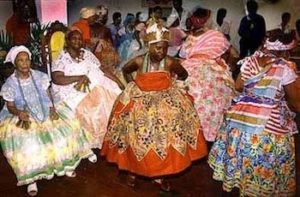
Umbanda ceremony
This date celebrates the Umbanda religion, which dates from 1600. This is one of several Black African faiths practiced in the Americas.
It began flourishing in the South American cities of Rio de Janeiro and São Paulo. Umbanda is an Afro Brazilian religion that mixes the teachings of Allan Kardec's spiritism, Catholicism, and sects brought by the African slaves. A man or woman usually directs the practice of Umbanda called "Pai [or Mre] de Santo" (saint's father or mother) or "Chefe de Terreiro" (Yard Chief), a medium who could incorporate dead people's spirits, called "Entidades" (Entities).
These spirits can be Caboclos (Indians), religious figures, doctors, African or Brazilian Negroes as "Pretos Velhos" (Old Blacks), "Pai Joaquim," "Pai Arruda," "Tia Joana," etc. These incorporations happen in meetings called "Sessxes" (Sessions), in the "Terreiro," "Centro" or "Tenda" (Yard, Center or Tent), a big room with an altar, where members sing "Pontos" (Points, chants for an entity), dance or hold the entity's counsels. During the session, the medium is helped by men and women and is called "Filhos de Santo" (Saint's Sons) or "Cambonos."
Suppose these meetings happen on the street, in forests, on beaches, or in other places. In that case, they are called Obrigações (Obligations), where the members pray and offer the entities food, flowers, candles, and gifts. Some Brazilians call Umbanda " macumba, " but this is wrong. The true Umbandists practice sorcery rituals to improve the lives of others, to practice goodness, and not to harm anyone.
The African American Desk Reference
Schomburg Center for Research in Black Culture
Copyright 1999 The Stonesong Press Inc. and
The New York Public Library, John Wiley & Sons, Inc. Pub.
ISBN 0-471-23924-0